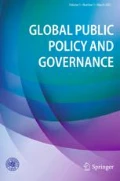Global Public Policy and Governance (GPPG) aims to spur new knowledge in the area of global public policy and governance. Its scope of research covers domestic public policy and governance with global relevance, comparative public policy and governance, policy interactions and diffusion across national borders, and regional/global policy and governance through supranational mechanisms. Subject areas covered by GPPG include general policy and governance studies and those in specific areas such as environmental affairs, economic development, social policy, urban issues, science and technology, international development, income inequality, crisis management, public health, and regionalization.
What is global public policy and governance? In recent years, schools, institutes, and programs on global policy and governance have increased throughout the world. Course contents in many academic fields recognize that growing connections among nations require new patterns and developments in public policy and governance. This is clearly seen in almost every area of human activity, and most recently in COVID-19, Brexit, border walls (migration from Central America), extreme weather events, food contamination, and more. Such events are neither the first, nor to be the last. In response to these, a need exists for increased sharing and diffusion of policy and governance experiences, including those based on research evidence. New models and policies are being developed now.
In our view, the scope of global studies is broad. It is not only about shared governance (e.g., Paris Accord), but also about local or national efforts that contribute to addressing global problems. It is not only about international and transnational policy regimes, but also about state policy and non-state actions that inform or transform how globally occurring problems are dealt with. Indeed, despite growing globalization and regionalization, practices of public policy and governance continue to be local and national. The scope of global studies includes every aspect of public policy, public governance, public administration and international relations in so far as it addresses significant problems that occur in many countries.
Developments around the world have increased the imperative of learning from other countries. All countries have much to offer. The economic success of East Asia has increased the need for developing high-quality studies of these governance systems. There exists a huge potential of theory and knowledge building by comparing public sector practices in Western and Eastern contexts. The journal welcomes studies from the Global South and around the world with equal enthusiasm.
Fortunately, burgeoning scholarship in public policy and governance has made great strides in the past decades around the world. The editors believe that voice needs to be given to high-quality research from around the world that addresses issues of widespread, if not global, relevance. GPPG facilitates these trends by providing a new outlet of academic presentation, exchange and debate for scholars in new and existing institutions with a global vision.
The journal promotes multidisciplinary research to reflect on how increasing global interdependence has shaped public policy and governance in its values, structures, dynamics, and consequences, and vice versa. The journal welcomes organizational, administrative, managerial, and policy-based research that explores public sector reforms and developments in an increasingly globalized world. For example, GPPG encourages innovative public administration research that breaks through current theoretical paradigms embedded in sovereignty boundaries. We welcome empirical work, case studies and theoretical inquiry that present new models and paradigms.
Scholars who publish in GPPG will join others in furthering knowledge and debate on matters of global importance. Scholars will find GPPG a welcome home for their creative works addressing widespread challenges in public policy and governance. We welcome your inquiries and suggestions on topics and symposia that push the boundaries of knowledge. We look forward to your submissions.
GPPG will be included in major databases such as Google Scholar, EBSCO host, ProQuest and more. Papers, once accepted, will be published first online. All papers on GPPG will be freely accessible from the journal website for 2021 and 2022. GPPG seeks to be included in major indexes of social sciences as soon as possible.
In short, GPPG aims to increase shared knowledge and practices, through rigorous research, of how common or significant problems are addressed from comparative or global perspectives, including cases or national experiences with global relevance.
Submission and review
GPPG is a quarterly journal that publishes research articles, review essays and book reviews. Papers shall be submitted to the journal’s online system, and will go through a standard editorial and peer-review process. Submissions receive immediate acknowledgement, editors aim to make eligibility/suitability decisions in 10 days and, thereafter, we strive to complete peer-review processes in 4–6 weeks. Authors are free to follow-up with us after these periods.
Editorial administration and hosting
The journal is hosted by the Institute for Global Public Policy of Fudan University. The Institute is a platform for policy studies driven by a genuine global and multidisciplinary perspective. The Institute operates a series of graduate degree programs in multiple policy and governance areas, aiming to educate the future generations of researchers and practitioners for the world.
Author information
Authors and Affiliations
Corresponding author
Ethics declarations
Conflict of interest
The authors declear that there is no conflict of interest regarding the publication of this article.
Rights and permissions
About this article
Cite this article
Jing, Y., Berman, E. & Gong, T. Editorial. GPPG 1, 1–3 (2021). https://doi.org/10.1007/s43508-021-00005-y
Accepted:
Published:
Issue Date:
DOI: https://doi.org/10.1007/s43508-021-00005-y

